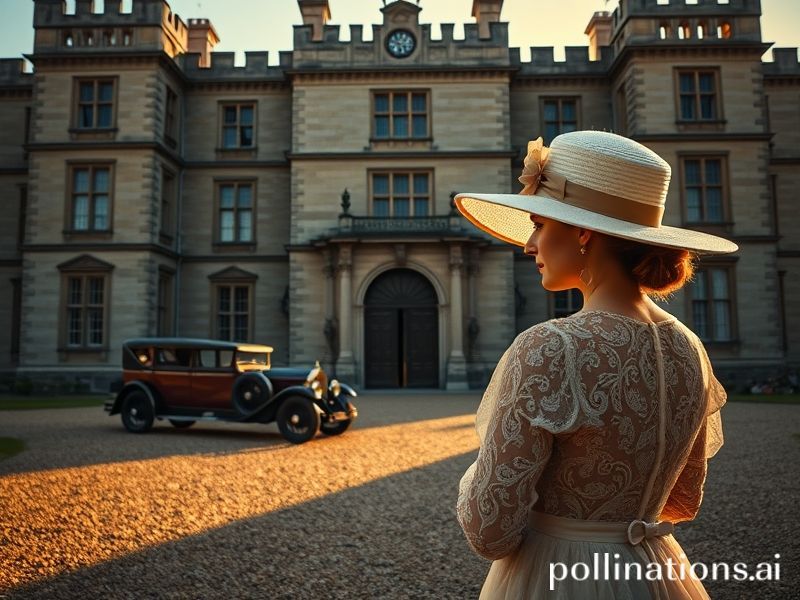From Yorkshire to the World: How Downton Abbey Became the Planet’s Guilty Pleasure and Soft-Power Export
The Crawleys Go Global: How a Yorkshire Country House Became the Planet’s Favorite Fever Dream
Picture it: while the Middle East was being carved into protectorates with the precision of a drunk cartographer, and Europe was busy stockpiling munitions like a housewife hoarding canned beans before Y2K, a fictional Earl of Grantham was worrying about the correct placement of fish knives. A century later, that same preoccupation with cutlery etiquette has become international comfort food—proof that when the world burns, humanity reaches not for water, but for polished silver.
Downton Abbey, Julian Fellowes’ genteel soap opera disguised as a history lesson, has now been streamed, subtitled, and simul-dubbed in more tongues than the Treaty of Versailles. From Seoul to São Paulo, viewers who have never seen a dinner bell outside of a Taco Bell queue have devoured six seasons, two films, and an avalanche of branded shortbread. The show’s global reach is such that Chinese censors trimmed only the subtlest hints of homosexuality—apparently class hierarchy is fine, but two footmen waltzing is a bridge too far. Meanwhile, in Russia, state television ran a marathon re-edit that recast the aristocrats as tragic victims of Bolshevik rudeness. Nothing says “soft power” like a butler’s pantry weaponised for ideological comfort.
Why does a chronicle of upstairs-downstairs repression play so well from Lagos to Lapland? Simple: it offers the oppressed a chance to gawp at the oppressors, and the oppressors a chance to pretend they’d have been charmingly benevolent. The Indian subcontinent—where the Raj still lingers like last night’s curry—tunes in for the costumes; Nigerians debate whether Carson would last five minutes in a Lagos traffic jam; Scandinavians watch for tips on hygge-by-osmosis. In short, Downton has become the world’s collective nostalgia for a past almost no one actually had. It’s Versailles with fewer beheadings, Mad Men without the existential dread, Succession except the siblings say “golly” instead of expletives.
The economic implications are deliciously absurd. Heritage Britain now exports more imaginary linen napkins than real ones; Highclere Castle sells £27 scones to Japanese tourists who bow politely before Instagramming the jam. UNESCO hasn’t listed Downton as world heritage yet, but give it time—soon we’ll have Syrian refugees taking audio tours in which Lady Sybil’s doomed marriage is explained as a cautionary tale about humanitarian intervention. The British Council, always keen to monetise the national talent for repression, has begun “Downton Diplomacy” workshops: foreign dignitaries learn to nod sympathetically while internally calculating interest rates.
Soft power scholars (yes, they exist, probably in cardigans) argue the franchise functions as a pacifier for late-capitalist anxiety. While gig-economy drivers in Jakarta queue for petrol, they can stream the Earl fretting about entail and feel momentarily superior: at least their inheritance isn’t legally tied to a cousin they’ve never met. Climate activists in Berlin binge the Christmas special to convince themselves that burning ten cords of yule logs was once aspirational rather than criminal. Even the metaverse has caught the bug: a Korean start-up is building a VR Downton where users can curtsy to NPC aristocrats for blockchain-verified social credit. One shudders to imagine the micro-transaction required for a duke to remember your name.
And yet, beneath the mahogany veneer, the show delivers a bleakly universal truth: hierarchy is the cockroach of human organisation. Swap corsets for corporate lanyards, footmen for unpaid interns, and the same pecking order persists—only the cutlery changes. Fellowes, a Tory peer himself, has essentially gifted the world a 50-hour masterclass in how to aestheticise your own subjugation. Viewers from Buenos Aires to Bangkok finish an episode, sigh at the injustice, then immediately Google where to buy Mrs Patmore’s pudding basin. Stockholm Syndrome, but with better lighting.
So as the Dowager Countess might mutter between withering one-liners, globalisation is merely imperialism with a polite RSVP. Downton Abbey didn’t end with the credits; it metastasised into a transnational coping mechanism, a plush red velvet security blanket we collectively pull over our heads while the actual abbey—this pale blue dot—continues its slow fiscal and environmental collapse. We are all downstairs now, polishing the silverware of a burning world and pretending the smoke is just the Earl’s after-dinner cigar. Chin-chin.







